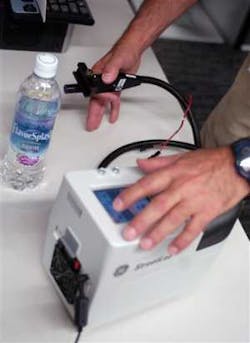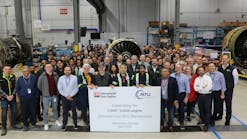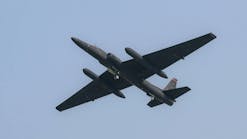Albuquerque-based ICx MesoSystems in 2000 sold about 10 of its air-sampling devices capable of sniffing out bioterrorism agents.
In the five years since the terrorist attacks of Sept. 11, the company has sold about 600 to federal, state and local agencies, driving up its sales this year to $7 million, or more than triple what they were in 2000.
"The events of 9/11 made everyone understand the importance of our product and sharpened their focus on homeland security," says CEO Chuck Call.
Five years after the terrorist attacks, the homeland security business is booming, and now it eclipses mature enterprises like movie-making and the music industry in annual revenue.
The business has moved from a frantic and often inefficient scramble in the wake of 9/11 to shore up security at airports to a much broader effort. The scope of security-related spending has expanded to include more sophisticated information technology and the protection of other vulnerable terrorist targets such as ports and nuclear reactors. And spending for anti-terrorism goods and services is expected to keep growing.
Governments and businesses worldwide expect this year to spend $59 billion to thwart terrorists, nearly a sixfold increase from 2000, according to industry tracker Homeland Security Research of Washington, D.C. By contrast, the motion-picture and music industries each generate about $40 billion annually. The research company expects homeland security spending to nearly double by 2010.
"It's one of the fastest-growing industries," says Tomer Amit, vice president of Homeland Security Research. Where the money is going:
*The companies benefiting range from big corporations such as Lockheed Martin to small companies such as ICx MesoSystems, which employs 35 people. Consultant Accenture has moved in five years from no involvement with homeland security to being one of the major contractors.
"The big winners of the homeland security windfall have, as usual, been the big contractors," says Dan Verton, founder of Homeland Defense Week, a website that broadcasts security news.
*Airport security was the initial focus, but the industry has expanded into a wide range of companies hawking all kinds of products and services for securing nearly every imaginable terrorist target.
The homeland security industry now includes chemical, biological and radiological detection, as well as border, rail, seaport, industrial and nuclear plant security. Other vendors include computer and human resources experts, boat makers for the Coast Guard, information and integrated technology companies, and myriad consultants.
*As the biggest customer in the field, the U.S. Department of Homeland Security, a post-9/11 creation, has played a major role in shaping the industry.
The agency has spent $28 billion over the 22-month period ended in August on security-related goods and services while issuing more than 115,000 contracts.
This year's contracts include: a $385 million award to Halliburton subsidiary KBR to establish temporary detention and processing capabilities in the event of an emergency influx of immigrants, and a $308 million to $750 million contract with Unisys to continue building, securing and managing the information technology infrastructure for the Department of Homeland Security and the Transportation Security Administration, one of its agencies.
*U.S. companies are benefiting most. The U.S. market will generate $29.1 billion in revenue this year from "the threat of terror," and U.S. companies will receive nearly all of it, Amit says. About 70% will come from federal, state and local government contracts.
$2 billion contract up for grabs
Five big corporations are battling for a $2 billion contract with the Homeland Security department to provide surveillance of the nation's borders, to be awarded this month. The government expects the winning contractor to develop a blueprint to protect the borders and to integrate the U.S. Customs and Border Protection agency's personnel, infrastructure, technology and rapid response capability.
The bidders are Lockheed Martin, Raytheon, Boeing, Northrop Grumman and wireless-equipment provider Ericsson.
Two years ago, another big corporation, Accenture, won potentially the largest contract in the Department of Homeland Security's short history. Accenture plans to use biometrics and other technology to process foreign visitors as they enter the country. The contract could run as long as 10 years and generate up to $10 billion for the company.
Accenture so far has received $185 million in revenue from the deal, says Jim Stolarski, Accenture's executive director of homeland security. He said the company will receive far less than the maximum.
Accenture, which had no employees dedicated to homeland security prior to the 2001 terrorist attacks, now has 20 senior executives and about 600 workers working for Stolarski.
"DHS is one of our largest and most important clients," says Stolarski, whose company reported revenue of $15.5 billion last year.
The opportunities continue to open, too, for ICx MesoSystems, the small Albuquerque company.
It's now marketing another air-sampling device for office buildings, a venture that "wouldn't be a possibility without an event like 9/11," CEO Call says.
But it's been rocky at times for Call's company. Sales spiked after 9/11 but then fell when a Defense Department official became concerned about false alarms from various companies' bioterrorism devices. Officials temporarily put a hold on purchases of all such equipment, Call says.
The CEO says he's now optimistic about sales growth, but "it always takes longer than you'd hope to introduce a new technology."
Contracts often go to big companies
After the Sept. 11 attacks, the government was in a "panicky phase" of procurement, says David Silverberg, editor of HSToday, a homeland security trade magazine. The country "had to do everything instantly, because many thought we were going to be nuked off the face of the Earth." As a result, he says, the homeland security industry "has grown at an extremely fast and disorganized pace."
But more recently, spending is being shaped by both successes and failures in the immediate aftermath of 9/11. This year, for example, has seen introduction of a second generation of anti-terrorism products, including walk-through baggage-screening portals at airports, and devices that can detect nuclear and biological threats.
Consultant Doug Laird, who worked for the U.S. Secret Service and was Northwest Airlines' security director, criticizes the Department of Homeland Security for awarding so many contracts to large corporations.
In general, he says, the contractors oversell the security value of their goods and services. Further, he says, the government exercises inadequate oversight.
"The DHS has pretty much given them an open check to supply products and services," he says.
Often, the large corporations "have no idea about" the work that needs to be done, Laird says. "In my opinion, it's a total rip-off."
The department's chief procurement officer, Elaine Duke, says the agency awards contracts based on "best value," and also makes sure that contractors or their subcontractors have the technical expertise required.
In June, the department selected 25 large companies to provide information technology under a contract worth about $45 billion over seven years. Small companies will also get some of the work.
During the fiscal year ending this month, small companies have been awarded direct contracts that represent 33% of all contract dollars spent by the department.
That surpasses a U.S. Small Business Administration goal of each federal agency awarding at least 23% of its contracts to small businesses, she says.
In addition, Duke says, the department requires large companies in "virtually every contract" to subcontract to small businesses 40% of the contract's value.
Bryan Ware, CEO of Virginia-based Digital Sandbox, a small business that does risk-assessment work for the department, doesn't agree that small businesses are being shut out, but he's aware that large corporations are benefiting the most.
"The big boys are taking the lion's share of the business, but you won't find a different story in any part of the federal government," he says.
Officials of Lockheed Martin, one of the 25 companies selected, say it makes sense that the giant defense contractor has been selected for numerous Homeland Security contracts.
The company has expertise in many areas and successfully completed contracts for various agencies before they were combined within one department after 9/11, says Senior Vice President Art Johnson. Many small companies "have tremendous capabilities," and Lockheed Martin often teams with them on large contracts, he says.
Global threat remains
Without another major terrorist attack like those of 9/11, Homeland Security Research, the industry tracker, expects the market for security goods and services to increase to $178 billion in 2015, or triple its current value.
But a major attack in the United States, Europe or Japan could increase the global market in 2015 to $730 billion, more than a twelvefold increase, the company says.
Most of the growth this decade will come from building what Homeland Security Research calls "a homeland defense infrastructure." Growth areas are likely to include technology for surveillance and for detection of nuclear and other weapons of mass destruction, Amit says.
That differs from the last five years, when the growth came mainly from airport security, information technology and combating bioterrorism with detection devices and stockpiling of vaccines.
The homeland security business is much bigger in the USA than in any country or region abroad, but that's changing. Rapid growth is expected in Europe, India and China. The USA will make up only 42% of the global market in 2015, Amit predicts.
Spending growth abroad, he said, will be driven by a variety of perceived terrorism threats, he says.
Western European countries have "a substantial population of Middle Eastern immigrants that can harbor terrorist cells," Amit says.
As economies of India and China grow rapidly, crime is rising and both are expected to join other Asian nations in an effort to combat crime and terrorism, he says.
Also, India has been embroiled in a long-running conflict with Pakistan over the region of Kashmir, he says.
The recent alleged plot to use liquid explosives to blow up U.S. airliners over the Atlantic will maintain the industry's steady growth, Amit says.
"It quiets the critics who say too much money is being spent on homeland security," he says. "The threat is not going away."
Copyright 2005 LexisNexis, a division of Reed Elsevier Inc. All rights reserved.
Terms and Conditions | Privacy Policy
News stories provided by third parties are not edited by "Site Publication" staff. For suggestions and comments, please click the Contact link at the bottom of this page.






